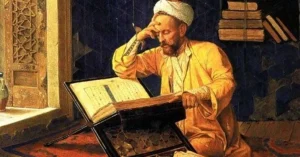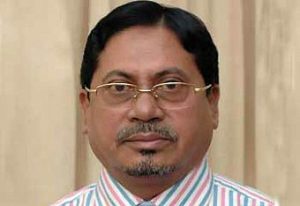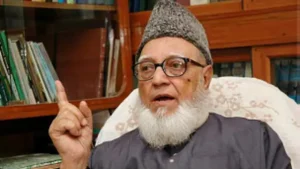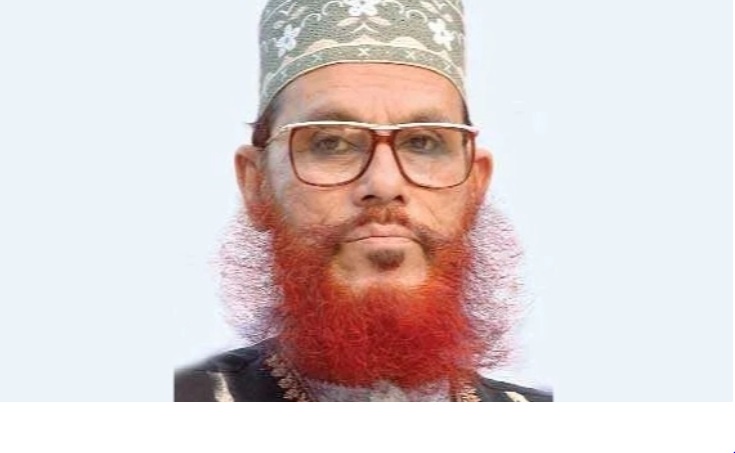
Political Journey and Struggles
From Preacher to Parliamentarian — The Political Life of Shahid Allama Delwar Hossain Sayeedi (رحمه الله)
1. Entry into Islamic Politics: Joining Jamaat-e-Islami (1979–1980)
After establishing himself as a respected Islamic scholar and da’ee, Allama Delwar Hossain Sayeedi(رحمه الله) formally joined Bangladesh Jamaat-e-Islami in 1979, inspired by the party’s commitment to Islamic values and constitutional politics.
- He was motivated by Syed Abul A’la Maududi’s philosophy and the writings of Maulana Motiur Rahman Nizami and Maulana Abdul Quader Molla.
- His entry into politics was not for power, but for Islamic reform through democratic processes.
- In his own words:
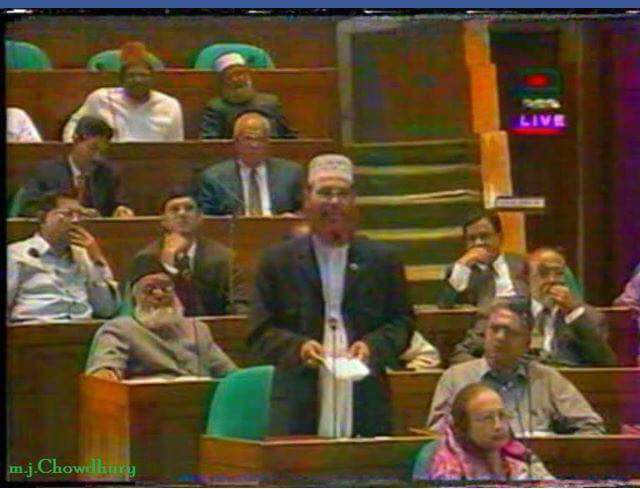
“Dawah without political engagement in a secular system is incomplete. If we don’t strive to implement Allah’s laws through legitimate means, we fail our mission.” — Sayeedi (رحمه الله), 1982
2. Rising Through the Ranks: From Local Leader to National Icon (1980s–1990s)
- Began as a District-level leader of Jamaat in Pirojpur.
- Became a member of the Central Majlish-e-Shura (Advisory Council) in the early 1990s.
- Gradually gained popularity as a national speaker and political leader due to his oratory and grassroots activism.
In this period, he began to speak on Islamic economics, social justice, and education in political gatherings, linking Qur’anic principles with modern legislation.
3. Election to Parliament: Member of Jatiya Sangsad (1996–2006)
(رحمه الله) was elected as a Member of Parliament (MP) from the Pirojpur-1 constituency in the 1996 general elections, and again in 2001, representing Jamaat-e-Islami under the Four-Party Alliance.
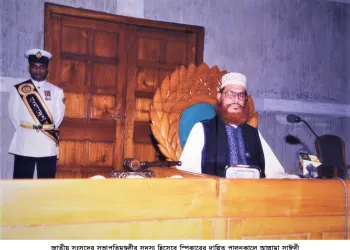
🏛 Parliamentary Contributions:
- Actively participated in budget discussions, education policy debates, and Islamic banking legislation.
- Advocated for the Islamization of Bangladesh’s legal and social systems, without compromising democracy.
- His parliamentary speeches often quoted the Qur’an and Hadith, which was rare in the secular-dominated house.
Key Areas of Focus:
- Anti-corruption reform
- Moral education in curriculum
- Social justice for the rural poor
- Women’s dignity in line with Islamic values
- He also raised concerns over the spread of anti-Islamic cultural elements in media and education.
📝 Parliamentary Record (2002): Sayeedi protested the softening of anti-drug laws, quoting Islamic jurisprudence on public safety.
4. Political Persecution and Arrests (2009–2013)
After the Awami League came to power in 2009, a nationwide crackdown on Islamic leaders began. Sayeedi became one of its most prominent victims.
🔴 Timeline of Political Persecution:
- July 2009: Arrested by the Rapid Action Battalion (RAB) on alleged incitement charges.
- August 2009: Transferred to Dhaka Central Jail; kept in solitary confinement.
- 2010: International Crimes Tribunal (ICT) was formed. Sayeedi was one of the first accused.
- 2011: Formal trial begins amidst widespread allegations of politically motivated charges, fabricated evidence, and international pressure.
- February 2013: Convicted and sentenced to death by ICT.
- The verdict sparked mass protests across Bangladesh, particularly by Islami Chhatra Shibir and general Muslims.
📌 Note: International human rights organizations, including Human Rights Watch and Amnesty International, criticized the tribunal’s lack of due process, witness intimidation, and political interference. [1]
🔴 Timeline of Political Persecution:
After the 2013 verdict, a viral claim spread that Sayeedi’s face appeared on the moon, which drew both mass emotional reaction and government suppression.
- Thousands of rural citizens believed it to be a divine sign of his innocence.
- Government reacted with crackdowns, arrests, and internet censorship.
“Even if my body is locked behind bars, my mission lives in the hearts of millions.” – Prison letter by Sayeedi (2013)
6. Life Imprisonment and Continued Influence (2014–2023)
- The death sentence was later commuted to life imprisonment by the Supreme Court in 2014.
- Sayeedi spent the remainder of his life in Kashimpur Central Jail.
Despite incarceration:
- He continued writing, especially tafsir works and prison reflections.
- Thousands visited his family annually during Eid.
- His speeches remained popular on YouTube, Facebook, and Islamic audio platforms.
7. Shahadat and Legacy (2023)
- On 14 August 2023, he passed away in jail custody due to heart complications, leading to mass mourning across Bangladesh and beyond.
- Janazah prayer was performed in absence of his body by millions.
- Critics and supporters alike acknowledged his intellectual depth, moral integrity, and unmatched Qur’anic scholarship.

“They tried to silence him with bars, but his words continue to echo in the hearts of the ummah.” — Islamic Thinker’s Forum, UK
Footnotes and References
[1] Human Rights Watch, Bangladesh: Ensure Fair Trials for War Crimes, 2013
[2] Official Records of Jatiya Sangsad Proceedings (1996–2006)
[3] Al Jazeera Documentary: War Crimes Trial or Political Revenge?
[4] Daily Star Archives (2009–2014)
[5] “The Rise and Trial of Delwar Hossain Sayeedi”, South Asia Islamic Review, 2021

